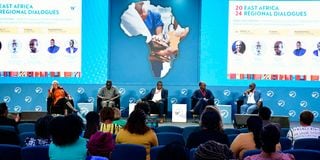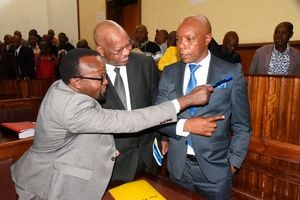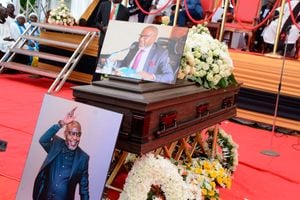Why excluding men from women's discussions might hurt more than help

A panel discussion on Impactful Male Allyship: Leveraging Men’s Power And Influence To Advance Gender Equality happening during the East Africa Regional Dialogues held at Radisson Blu Hotel on October 11, 2024. The even organized by WomenLift Health was held under the theme of Empowered to Lead - Centering Allyship and Gender Equality to Transform Global Health Leadership. Francis Nderitu | Nation
There was a furore when a photo was shared on social media of two men representing Somalia at this year’s Women, Peace and Security (WPS) Focal Points Network meeting held in New York from October 21 to 22. The meeting themed Reclaiming Women, Peace and Security: Defining a Path Forward assessed the adaptability and evolution of the WPS framework and strengthening of the implementation of WPS national action plans.
It featured the Minister for Family Affairs and Human Rights Development, Gen Bashir Mohamed Jama, and his advisor, both male. Hawk-eyed activists interpreted the post to mean that Somalia sent an all-men delegation to an event primarily discussing women. It would certainly be scandalous if this were true. Fortunately, it was soon clarified that the delegation included two women Iman Elman, a senior military officer, and Sadia Mohammed Nur, a ministry official.
The criticisms tended to imply that the Somalia government was not serious about women’s issues. But there could be contrary views. One, sending a delegation to the event alone demonstrates commitment. Two, the Somalia is party to the UN Security Council Resolution 1325, the foundation of the WPS agenda, and in fact launched a National Plan of Action on September 5, 2022, to implement the same. Three, Somalia sent the male minister in his official capacity not because of his gender. In fact, out of the total 197 delegates from 57 countries, 21 were men.
This raises the question of whether men should attend women’s forums. Conservative and radical feminists oppose male attendance, viewing all men as oppressors of women The liberal schools of thought view the issue differently. For instance, they trace women’s oppression to the social construction of gender and seek a systematic transformation of the root causes of gender equality. Liberal feminists also vouch for legal and policy action to deal with women’s marginalisation so that change is not left to evolutionary forces.
Disciples of liberal feminism would tolerate inclusion of men, based on the conviction that more and more should be exposed to understand the movement and become allies. Indeed there are men who confess that they only understood and appreciated gender equality when required by their jobs as public service officials, parliamentarians, artists and civil society workers to articulate and promote the same. Thus, including men plays a self-sensitising role. More men get sensitised through university courses on gender.
Today, it is largely accepted that the quest for gender equality benefits from men’s involvement. In this regard, inclusion of men in Somalia’s delegation should be praised. The problem would only arise if these men undermined the agenda and left the forum without enhanced understanding of, and commitment to the gender equality cause.
The critics also took a jibe at the fact that Somalia changed the name of the original Ministry of Women and Human Rights Development to Family Affairs and Human Rights Development, and then assigned a man to head it! They say this is contemptuous and denies women space even in one structure that directly deals with their issues. They argue that the change effected in July makes women invisible in Somalia’s priorities.
The issue of nomenclature is not unique to Somalia. In Kenya, successive regimes have tinkered with the name, unable to settle on a standard one for the ministry that domiciles the gender docket. In the 1980s/90s, women’s issues (as known then) were domiciled in the Women’s Bureau in the Ministry of Culture and Social Services. During Mwai Kibaki’s regime, gender belonged to the Ministry of Gender, Sports, Culture and Social Services and later Ministry of Gender, Children and Social Development.
In Uhuru Kenyatta's first five years, gender was under the Ministry of Devolution and Planning. In his second term, it was roosted in the Ministry of Public Service, Youth and Gender Affairs. Currently, it is in the Ministry of Public Service, Gender and Affirmative Action. Another national machinery handling gender issues is the National Gender and Equality Commission. These structures have are male staff. It would be foolhardy to dismiss them just on account of identity.
Back to the picture, the issue is perhaps not that men were included in the delegation but that the photo featured only them, leading to a public misperception. Could William Shakespeare have called the outrage “much ado about nothing” and asked whether a rose loses its fragrance if called by another name?
The writer is a lecturer in Gender and Development Studies at South Eastern Kenya University ([email protected]).




